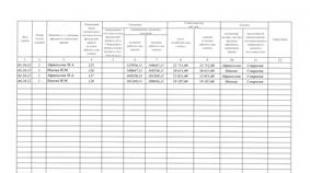Sample order to change accounting policies. Order on accounting policies
And accounting statements in the Russian Federation", approved by order of the Ministry of Finance of the Russian Federation dated July 29, 1998 No. 34n, the Accounting Regulations "Accounting Policy of the Organization" PBU1/2008, approved by order of the Ministry of Finance of the Russian Federation dated October 6, 20 08 No. 106n, and others regulatory documents in order to ensure that the organization during the reporting year observes a unified methodology for reflecting business transactions in the accounting records and fulfilling the requirements of tax legislation in accordance with the Tax Code of the Russian Federation
I ORDER:
1. Approve the accounting policy for the purposes of accounting and tax accounting of the enterprise for 2013.
Accounting policy of LLC **X" for accounting purposes
1.7. If it complies with the status of a small business entity, the enterprise may not apply the Accounting Regulations “Accounting for calculations of corporate income tax” PBU 18/02 (clause 2 of PBU 18/02).
1.8. This accounting policy is not exhaustive. When significant changes are made to the legislative acts regulating the accounting procedure, corresponding changes are made to the accounting policy of the enterprise. Also, the enterprise may make additions to the accounting policy as new facts of economic activity arise that did not occur previously, for a more reliable assessment of the financial position and financial results of the enterprise.
2. Documentation of business transactions.
2.1. The basis for entries in accounting registers are primary documents recording the completion of a business transaction. Primary documentation included in OKUD is used. If non-standard documents are used, the form of each document is approved by the manager.
2.3. Property, liabilities and business transactions for reflection in accounting and reporting are assessed in monetary terms by summing up the actual expenses incurred in the currency in force in the Russian Federation (rubles).
2.4. In order to ensure the reliability of accounting and reporting data, inventory is carried out once a year as of December 31.
3. Accounting statements. Rules for evaluating financial statements items.
3.4. Assets in respect of which the conditions provided for in clause 4 of the Accounting Regulations “Accounting for Fixed Assets” PBU 6/01 are met, and cost no more than 20,000 rubles. per unit are reflected in accounting and financial statements as part of inventories. In order to ensure the safety of these objects in production or during operation, proper control over their use should be organized. When writing off fully depreciated fixed assets or liquidating them for other reasons, individual parts (based on the conclusion of the commission) are accounted for at the price of possible use, reflected in the debit of the materials accounts and the credit of account 91 “Other income and expenses.” If it is impossible to capitalize individual parts (based on the conclusion of the commission), the specified fixed assets are written off completely.
3.5. The enterprise does not create a reserve for all types of repairs of fixed assets and reflects the costs of restoring fixed assets in the accounting of the reporting period, to which they are classified as expenses for ordinary activities,
3.6. Accounting for intangible assets at an enterprise is carried out in accordance with the Accounting Regulations “Accounting for Intangible Assets” PBU 14/2007, approved by Order of the Ministry of Finance of the Russian Federation dated December 27, 2007 No. 153n.
The accounting unit for intangible assets is an inventory item.
3.7. The cost of intangible assets with a certain useful life is repaid through depreciation over their useful life. Intangible assets with an indefinite useful life are not subject to amortization.
The useful life is the period, expressed in months, during which the organization expects to use the intangible asset in order to obtain economic benefits. Intangible assets for which it is impossible to determine the useful life are considered intangible assets with an indefinite useful life. The useful life of an intangible asset is determined based on:
- the validity period of the organization’s rights to the result of intellectual activity or a means of individualization and the period of control over the asset;
- the expected life of the asset over which the entity expects to receive economic benefits.
3.8. The choice of method for determining the amortization of an intangible asset is made by the organization based on the calculation of the expected receipt of future economic benefits from the use of the asset.
In the event that the calculation of the expected receipt of future economic benefits from the use of an intangible asset is not reliable, the amount of depreciation charges for such an asset is determined using the straight-line method.
3.9. Accounting for inventories at the enterprise is carried out in accordance with the Accounting Regulations “Accounting for inventories” PBU 5/01, approved by Order of the Ministry of Finance of the Russian Federation dated 06/09/2001 No. 44n. Inventories are accepted for accounting at actual cost. Materials include material assets with a service life of up to one year, regardless of their cost.
3.10. Inventories written off to production or sold externally are valued at average cost.
3.11. The company does not create reserves to reduce the cost of material assets.
3.12. Accounting for distribution costs should be reflected on account 44 “Sales expenses” broken down by elements and cost items.
Costs are taken into account in the reporting period to which they relate, regardless of the time of their payment - preliminary or subsequent. In accounting, costs are charged to cost in full according to primary accounting documents, regardless of the feed and standards established for tax purposes. The company's expenses for transporting goods are recorded in account 44 "Sales expenses". Transport costs are included without the cost of the balance attributable to the balance of the goods, which is calculated according to a special calculation,
3.13. Expenses incurred in the billing period, but related to the following reporting periods, are reflected in account 97 “Deferred expenses” and are subject to attribution to production and distribution costs during the period to which they relate.
3.14. The accrual of property tax is reflected in account 91 “Other income and expenses”.
3.15. Financial investments, accounting of credits and loans. When disposing of an asset accepted for accounting as a financial investment, its value is determined by the initial cost of an accounting unit for financial investments (clause 26 of PBU 19/02). Expenses on loans and credits are reflected in the reporting period to which they relate (clause 6 of PBU 15/2008).
3.16. Long-term debt is accounted for in account 67 “Settlements for long-term loans and borrowings” as part of long-term debt without transferring to short-term debt.
3.17. The enterprise does not create reserves for doubtful debts for settlements with other organizations for products, goods, and services.
3.18. The company does not create reserves for future expenses.
3.19. Uncollected receivables and payables, for which the statute of limitations has expired, are written off and included in the financial results of the enterprise.
3.20. Income received in the reporting period, but related to the following reporting periods, is reflected in accounting separately and is included in the financial results at the beginning of the reporting period to which they relate.
3.21. Balance sheet profit (loss) is the final financial result identified for the reporting period on the basis of accounting of all business transactions of the enterprise and assessment of balance sheet items in accordance with this Order and regulatory documents.
3.22. The use of retained earnings, the frequency and order of distribution are determined by the decision of the founders.
3.23. The organization submits financial statements in the amount and in the forms provided for by Order of the Ministry of Finance of the Russian Federation dated July 22, 2003 No. 67n.
Accounting policy of LLC *"X" for tax accounting purposes
4. Tax accounting at the enterprise is carried out in accordance with the Tax Code of the Russian Federation and other regulatory documents.
4.1. Accounting for income from the sale of goods (work, services) for tax purposes is recognized on the accrual basis (Article 271 of the Tax Code of the Russian Federation). Accounting for expenses related to the activities of an enterprise for tax purposes is recognized on an accrual basis in the reporting period to which it relates, regardless of the time of actual payment (Article 272 of the Tax Code of the Russian Federation). This provision also applies to income from the sale of other property, as well as non-operating income and expenses.
4.2. Expenses for the sale of goods, works, and services are included in the cost in proportion to the sales income received from these types of activities.
4.3. Write-off of raw materials, materials and goods used in the production of work, services and sales of goods for profit tax purposes is carried out using the average cost method (clause 8 of Article 254, subclause 3 of clause 1 of Article 268 of the Tax Code of the Russian Federation).
4.4. When selling or otherwise disposing of securities, write off the cost of securities at unit cost (Clause 9, Article 280 of the Tax Code of the Russian Federation).
4.5. For profit tax purposes, the linear method of depreciation of fixed assets is used based on their useful life (Article 259 of the Tax Code of the Russian Federation). In case of acquisition of used fixed assets, the enterprise has the right to determine the useful life taking into account the service life of the previous owners (Clause 12 of Article 259 of the Tax Code of the Russian Federation).
4.6. Property worth up to 20,000 thousand rubles is included in material costs in full as it is put into operation.
4.7. Expenses for the repair of fixed assets are recognized in the reporting period in which they are incurred, in the amount of actual costs (Article 260 of the Tax Code of the Russian Federation).
4.8. Direct expenses include the cost of purchasing goods, formed taking into account the costs associated with the acquisition of these goods (reflected in the accounting register under account 41 “Goods”), sold in a given reporting period and the amount of delivery costs (transport costs) of purchased goods (Art. 320 Tax Code of the Russian Federation). All other expenses, with the exception of non-operating expenses determined in accordance with Art. 265 of the Tax Code of the Russian Federation, carried out in the current month, are recognized as indirect expenses and reduce income from sales of the current month (Article 32 of the Tax Code of the Russian Federation).
4.9. Expenses for banking services are included in non-operating expenses (subclause 15, clause 1, article 265 of the Tax Code of the Russian Federation).
4.10. Tax accounting is carried out in accordance with the Tax Code of the Russian Federation in accounting registers with the addition of accounting registers that record income (expenses) that are not recognized for tax purposes (Article 313 of the Tax Code of the Russian Federation).
4.11. The company does not create reserves for doubtful debts.
4.12. The company does not create a reserve for future expenses for repairs of fixed assets, payment of vacations, etc.
4.13. If a loss (losses) is generated in the previous tax period or in previous tax periods, the enterprise has the right to reduce the tax base of the current tax period by the amount of the resulting loss in accordance with the procedure provided for in Art. 283 Tax Code of the Russian Federation.
4.14. Monthly advance payments for income tax are calculated in equal shares in the amount of one third of the actually paid quarterly advance payment for the quarter preceding the quarter in which the monthly advance payments are made.
To approve the accounting policy for tax purposes for 2018, an organization or individual entrepreneur needs to issue an order on accounting policy. Here is a sample order for approval of accounting policies for tax purposes, which you can download and adjust for yourself.
Order on accounting policy
The Tax Code of the Russian Federation allows the taxpayer to choose a taxation system (for example, LLC, simplified tax system or UTII). However, to determine the tax base for the chosen taxation regime, various application options are provided. Which of the acceptable options to use in practice is decided by the management, the organization’s accountant or individual entrepreneur. In this case, the final decision should be written in the accounting policy for tax purposes and approved by order on the accounting policy.
There are no standard models of accounting policies, so you can draw up an order for approving the accounting policies in any form. Moreover, the provisions of the accounting policy can be included either in the text of the order or issued as an appendix to it (the order).
The newly created organization and those that emerged as a result of the reorganization must approve the accounting policy within 90 days from the date of state registration. This document must be applied from the moment the new organization (successor organization) is created. This procedure is established by paragraph 2 of clause 9 of PBU 1/2008. At the same time, there are no penalties for violating the deadlines for approving accounting policies.
The adopted accounting policy can and should be applied consistently from year to year (Part 5 of Article 8 of the Law of December 6, 2011 No. 402-FZ). That is, there is no need to approve a new document every year.
Order on accounting policy: form
Let's consider the option when an organization or individual entrepreneur does not want to describe elements taking into account the policy directly in the order. Then the accounting policy itself can be written down in the appendix, and the order itself can be prepared as a separate (independent) document. Here is a sample form of an order on accounting policy for tax purposes for 2018.
Sample order for approval of accounting policies: OSN
Let's assume that the organization applies the general taxation system (OSNO). Then, in the order on the organization’s accounting policy, it is necessary to describe the methods of action in relation to the taxes that the organization deals with in the course of its activities (for example, income tax or VAT). Under the general taxation system, a sample order for approval of accounting policies for tax purposes for 2018 may look like our example. .
Sample order for approval of accounting policies: simplified tax system
If an organization or individual applies a simplified taxation system, then its accounting policy for 2018 must also be approved by order. Accordingly, if an organization applies the simplified tax system with the object of taxation “income”, then the accounting policy needs to describe the elements associated specifically with “income”. Here is a sample order approving the accounting policy for tax purposes of an LLC with the object “income”. In this order, the accounting policy for 2018 is issued as an annex to the order. .
If an organization applies the simplified taxation system with the object “income minus expenses,” then by order it is necessary to approve the accounting policy for 2018 in relation to this taxation regime. As an example, you can take an order to approve a policy with the “income” object.
Sample order for approval of accounting policy: UTII
If you apply UTII, then as an annex to the order you will have an accounting policy for tax purposes relating to this tax regime. The order itself approving the accounting policy for 2018 will be classic, and the policy itself, of course, will relate to a special tax regime when paying a single tax on imputed income in 2018. .
Order on accounting policies– the most important document of the enterprise. It establishes the procedure for maintaining the main types of accounting (accounting and tax), approves the methods and techniques selected from the entire possible variety of permitted accounting standards that correspond to the individual characteristics of the organization’s activities.
Thoughtful and structured, it has a positive effect on individual company performance indicators (product cost, pricing policy, tax planning, etc.) and improves the financial condition of the entity as a whole.
Who approves
The accounting policy is formed by the person in charge of the company. As a rule, such a person is the chief accountant.
The order is approved by the head of the company no later than December 31, since the methods prescribed in it are applied from the beginning of the year immediately following the year of adoption of the document.
If an organization approves an order for several years at once, then, given the number of changes occurring in legislation during the reporting period, it is advisable to include annual amendments.
An order can be one document consisting of sections, one of which discusses individual aspects of accounting, and the other is devoted to tax accounting. Or two separate orders are created and approved for each type of accounting.
Formation procedure for accounting purposes
 There are no direct instructions for drawing up accounting policies. provides only the listing of the necessary data.
There are no direct instructions for drawing up accounting policies. provides only the listing of the necessary data.
The order establishes:
- a working chart of accounts, which contains analytics and synthetic accounts necessary for organizing accounting, in accordance with the rules for maintaining its timeliness and completeness;
- forms of used primary documents, enterprise documentation for internal use, accounting registers;
- a method of inventorying the company's debts and assets, as well as methods for their evaluation;
- procedure for controlling business transactions;
- rules for the circulation of documentation and other points without which a full-fledged organization of accounting is impossible.
Resolving the issues of how and in what order the enterprise plans to disclose the necessary information is independent initiative of the organization. The main thing here is to maintain a systematic approach and ease of use.
Methods to be disclosed in the TOU:
- depreciation of fixed assets and intangible assets;
- assessment of production resources;
- acceptance of proceeds from the sale of goods, etc.
It is not necessary to describe transactions that are not included in the company's records. If the company does not have financial investments, intangible assets, does not carry out capital construction, etc., no need to indicate similar transactions in accounting policies.
When new transactions appear that have not been encountered before, you can prescribe the order in which they are reflected in accounting at the time of their appearance, be it the middle of the year or its end.
Consolidating the method of accounting for facts that arose for the first time in the company’s economic activities does not constitute a change in the CP.
Accounting policies also establish general methods for accounting and taxes, regarding:
- write-off of funds;
- recognition of expenses;
- depreciation;
- period of OS use.
There are some features that need to be taken into account when forming the UE certain types of organizations:
- agricultural enterprises it is worth paying close attention to land accounting as the main means of production, developing the specifics of accounting in livestock and crop production;
- trading companies you should dwell in detail on the formation of the cost of goods, their write-off, and transportation costs;
- credit structures it is necessary to correctly distinguish between financial and management accounting;
- non-profit organizations it is necessary to prescribe a method for separate accounting of target funds, etc.
For tax accounting
UE for tax accounting summarizes information about the operations carried out by the organization during the reporting period in order to determine the base for taxes and contributions. This procedure is established in accordance with the regulations of the Tax Code of the Russian Federation.
When accounting for tax purposes at an enterprise, they use data:
- primary documentation (on the basis of which accounting is organized);
- analytical registers, statements, calculations and tables necessary for the formation of such registers;
- calculation of the tax base.
 Tax registers are therefore a source of data when preparing tax returns. They are required by Federal Tax Service inspectors when conducting inspections. Most often, tax registers are formed on the basis of accounting programs.
Tax registers are therefore a source of data when preparing tax returns. They are required by Federal Tax Service inspectors when conducting inspections. Most often, tax registers are formed on the basis of accounting programs.
According to special regimes established on the territory of the Russian Federation, no regulation required, since their tax base is clearly stated in the chapters of the code, and no ambiguous interpretations are provided for.
In this case, the type of regime used should be indicated in the UE, for example, simplified taxation system, unified agricultural tax. The rules for forming bases for such taxes are regulated so strictly that they completely exclude maneuverability for the company.
The UP on taxes should contain solutions to certain issues that are not disclosed when standardizing settlements with the state for any tax, or issues that do not have an unambiguous interpretation.
For example, according to income tax should be written:
- cost and income recognition method;
- separate accounting for targeted financing;
- depreciation bonuses;
- material costs;
- dividing costs into direct and indirect;
- reservation of expenses, etc.
By VAT a distinction should be made between transactions subject to this tax and those exempt from taxation or taxed at a rate of 0%.
Separate accounting is permitted not to maintain or distribute “input” VAT in cases where the share of expenses for the purchase, production, sale of the subject of the transaction or property is less than 5% of the total costs.
By MET needs to be revealed:
- the method by which the amount of extracted raw materials is determined;
- assessment of the cost of extracted raw materials;
- method of applying tax deductions (exclusively for coal mining).
What changes should you pay attention to?
The accounting policy is exclusively an internal document of the enterprise, and there is no need to submit it to the tax authorities. But, as part of the inspection carried out at the enterprise, inspectors have the right to demand this order and will be fined for its absence. Also, a competent management program allows you to argue the position of the organization in legal disputes with the Federal Tax Service and can persuade the judge to make a decision in favor of the company.
 Since contributions for compulsory insurance have come under the control of the Federal Tax Service since this year, it is necessary to approve in the order the form of a card for personalized accounting of the amounts of accrued contributions.
Since contributions for compulsory insurance have come under the control of the Federal Tax Service since this year, it is necessary to approve in the order the form of a card for personalized accounting of the amounts of accrued contributions.
Previously, policyholders used forms that were established by the Pension Fund and the Social Insurance Fund. The Federal Tax Service, in turn, they did not approve new card forms, leaving organizations the right to independently choose the form of this register. The chosen methodology must be reflected in the UE, since accounting for contributions and remunerations is now regulated by the Tax Code of the Russian Federation.
Fixed assets
The latest version of Resolution No. 1 dated January 1, 2002 came into force. Now the recommendation on using a fixed asset classifier in enterprise accounting has been removed from this regulatory document.
Previously, the use of the classifier implied the absence of discrepancies in tax and accounting. There is no prohibition on continuing to use this method, but the enterprise has the right to determine the period of useful use of the OS based on the manufacturer’s recommendations. The chosen method should be fixed in the UE.
Small businesses
Organizations belonging to the small business sector have certain preferences in terms of accounting and reporting. They can organize record keeping and prepare reporting in a simplified form.
For example, small businesses may account for raw materials and supplies at seller prices without including agent fees, transportation costs, and other related costs. And it is possible to write off inventories at a time.
In order to use possible relaxations, it is necessary to register and approve each of them in the order on the UE.
From this video you can learn how to maintain accounting policies correctly.
Any organization must maintain accounting and tax records, recording the methods of their maintenance in its accounting policies. The accounting policy of the organization creates a unified system of accounting and document flow, which all employees and divisions of the company must follow. Lack of accounting policies is a serious violation for which the company can be fined. How to draw up an accounting policy for 2018, and what features should be taken into account - this is what our material is about.
Accounting policy of an enterprise: general requirements for registration
The accounting policy is drawn up in accordance with the rules established by the accounting law No. 402-FZ of December 6, 2011, as well as PBU 1/2008. In addition, each industry may have its own regulations that affect its content.
The accounting policy consists of two parts: accounting and tax. They can be drawn up as a single document consisting of two sections, or two separate provisions can be made.
The organization's accounting policies are applied continuously from year to year, and reasonable changes to it can only be made from the beginning of the reporting year. The order on the accounting policy is approved by the manager no later than 90 days after registration of the company. For example, the accounting policy for 2017 should have been adopted before December 31, 2016, and the document approved in 2017 will come into force only on January 1, 2018.
An organization's accounting policies should reflect accounting methods only for actual assets, transactions, and liabilities. It is advisable to fix in the text of the document those accounting aspects for which there is a choice from several options, or the law does not contain an unambiguous interpretation on them. For example: what methods of depreciation are used, how reserves are created, etc. It makes no sense to rewrite unambiguous provisions of the PBU, or the Tax Code, that do not offer a choice.
“Accounting policies of the organization” PBU 1/2008: changes
From 08/06/2017, amendments to PBU 1/2008 “Accounting Policy of the Organization” came into force (Order of the Ministry of Finance of the Russian Federation dated 04/28/2017 No. 69n). Its provisions include, in particular, the following innovations:
- PBU “Accounting Policies” now applies to all legal entities, except credit and government organizations,
- a rule has been introduced on independent choice of the accounting method, regardless of the choice of other organizations, and subsidiaries choose from the standards approved by the main company (clause 5.1),
- the concept of rational accounting has been clarified - accounting information must be useful enough to justify the costs of its formation (clause 6),
- in cases where there is no specific method of accounting in federal standards, the organization develops it itself, based on paragraphs. 5 and 6 PBU 1/2008 and accounting recommendations, consistently referring to IFRS standards, federal (PBU) and industry accounting standards (clause 7.1), and to companies conducting simplified accounting (small enterprises, non-profit organizations, Skolkovo participants) , when forming an accounting policy, it is enough to be guided by the requirements of rationality (clause 7.2),
Contents of the accounting policy of the organization (LLC)
Accounting policies should reflect:
- list of regulations on the basis of which the company keeps records: Law on Accounting No. 402-FZ, PBU, Tax Code of the Russian Federation, etc.,
- working chart of accounts, designed as an annex to the accounting policy,
- positions responsible for organizing and maintaining records in the company,
- forms of the “primary” used, accounting and tax registers - unified forms, or independently developed,
- depreciation issues – calculation methods, frequency (monthly, once a year, etc.),
- limits on the value of fixed assets, the procedure for their revaluation,
- accounting of materials, finished products, goods,
- accounting of income and expenses,
- the procedure for correcting significant errors and the criteria for classifying them,
- other provisions that the organization deems necessary to reflect.
If the “accounting” part of the organization’s accounting policy is quite universal for everyone, then the tax part will be different for each taxation regime, but in any case should contain:
- information about the applicable tax system, and if there is a combination of tax regimes - the procedure for maintaining separate accounting,
- how taxes are paid in separate divisions, if any,
- whether the company has tax benefits, and under what conditions they apply.
Accounting policy of the simplified tax system
The nuances of tax accounting policy when “simplified” depend on the selected object: “income” (6%) or “income minus expenses” (15%).
When applying the simplified tax system “income”, tax policy should reflect:
- income accounting procedure,
- indicate how the paid insurance premiums reduce the tax base,
- in what order and at what rate are taxes and advance payments calculated,
- tax register - KUDIR.
With the object “income minus expenses”, special attention should be paid not only to income, but also to expenses, indicating:
- the procedure for accounting for fixed assets, the method of calculating depreciation,
- composition of material costs,
- procedure for accounting for sales costs (if any),
- recognition of past losses in the current period,
- procedure for calculating and paying the minimum tax,
Otherwise, the tax policy points will be similar to those indicated for the simplified tax system for “income”.
OSNO accounting policies
One of the main points of tax policy under OSNO is accounting for income tax. The document should reflect:
- procedure for recognizing direct and indirect expenses of an enterprise (cash or accrual method),
- the procedure for accounting for fixed assets, whether increasing coefficients are used for depreciation, depreciation bonus, for which objects,
- methods for assessing materials, raw materials and goods,
- Are reserves formed to evenly distribute expenses throughout the year (vacations, bad debts, OS repairs, etc.),
- in what order is income tax and advance payments on it calculated and paid,
- applicable tax registers, etc.
The specifics of VAT accounting when developing accounting policies should be pointed out to those who are exempt from tax or who carry out transactions taxed at a rate of 0% - this concerns the order of distribution of “input” VAT.
Accounting policy: sample
It is impossible to create a sample accounting policy that would be equally suitable for all enterprises. Each case has its own characteristics, depending on the type of activity, the applied tax regime and many other factors. The accounting policy, an example of which is given here, was drawn up for an enterprise operating on OSNO.
The form of the order on accounting policy, in addition to the general rules of registration, must take into account special provisions of the law. What might such an order look like? When and by whom should it be approved? We will consider the answers to these and other questions in the material below, and also provide a sample order on approval of accounting policies for 2019, which can be downloaded completely free of charge.
What should an order approving accounting policies include?
Formation of an order for approval of accounting policies (AP) is a process that is subject to internal requirements for the development and approval of general administrative documentation.
The accounting legislation and the Tax Code of the Russian Federation do not say anything about the content of the order approving the UE, therefore:
- the structure of the order is standard (generally accepted in a given company) for this type of document (title of the order, explanatory and administrative parts, signature of the manager);
- order form - it is drawn up in any form with the obligatory indication of the number of this document, its topic and date;
- content of the order - its text may reflect important aspects for the company (for example, from what date the CP is introduced, indication of the full name and position of the responsible employee who is entrusted with monitoring the execution of the CP).
Read about the types of general orders in the following materials:
- “Orders for core activities – what are these orders?” ;
- “Orders for personnel - what are these orders (types)?” .
Date of order approving accounting policies
To approve the UE means to establish that its application is mandatory for a specific business entity starting from the date of the approving document.
When drawing up an order for approval of the UE, the following rules must be taken into account:
- a newly formed company (comprising the UP for the first time) must have time to develop and approve an accounting policy no later than 90 days from the date of its state registration (paragraph 2, clause 9 of PBU 1/2008) - the UP in this case is considered applicable from the date of state registration;
- if it is necessary to make changes to the current UP, an order for its approval can be issued on any date of the current year, but such UP will come into force according to special rules.
Thus, the amended UP comes into force:
- from January 1 of the year following the year of creation of the corresponding order (paragraph 1, clause 9 of PBU 1/2008) - if the changes affected the accounting methods used by the company and they occurred at the will of the company itself;
- from the moment the amended norms of accounting legislation come into force - if the reason for making changes to the administrative regulations was changes in accounting regulations.
The above applies to the specifics of determining the date of the order to approve the management program (or its changes) for accounting purposes.
With the tax UP and the order approving it, the situation is somewhat different: the Tax Code of the Russian Federation does not say anything about the dates of approval of the UP by newly formed companies. At the same time, you should not rely on 90 days - the norm established for unitary enterprises for accounting purposes.
For example, the Tax Code of the Russian Federation for individual taxpayers requires the payment of monthly advance payments of income tax - thus, after a month of operation, the newly formed company must have a methodology for calculating these payments enshrined in the UP.
Read about the nuances of “profitable” advance payments in the article “Advance payments for income tax: who pays and how to calculate?” .
Thus, it is important for newly created companies to form and approve the Management Program as soon as possible - already within the first month of their existence.
With regard to the date of execution of the order approving the new edition of the tax management policy (when adjusting accounting methods at the will of the company or in connection with changes in tax legislation), the approach to the date of the order is similar to that described above for the accounting policy.
Who approves the accounting policy of the enterprise
The management program is approved by the head of the organization - this condition is established by law:
- clause 4 PBU 1/2008 - for unitary enterprises for accounting purposes;
- Art. 313 of the Tax Code of the Russian Federation - for tax management.
The role of the chief accountant is no less important - his responsibilities (among others) include the process of forming the management system.
However, a situation where the chief accountant will need to sign the order approving the management program is possible if two circumstances coincide:
- The UP must be approved and put into effect in the company legally;
- the manager is absent, having given the right to sign administrative documentation to the chief accountant.
For information on how to authorize the chief accountant to sign documents for a manager, read the materials:
- “Order on granting signing rights to the chief accountant” ;
- “Order on the right to sign primary documents - sample” .
In addition to the chief accountant, any authorized person has the right to sign an order to approve the management plan, if such a duty has been assigned to him by the head in a separate order or power of attorney.
Sample order for approval of accounting policies for 2019
Let's look at an example of how to draw up an order approving an accounting policy (sample).
Example
Tekhnomash LLC received a state registration certificate on 03/01/2019. Activities began on the same date. According to the criteria, Tekhnomash LLC is classified as a small business and plans to apply a general taxation system.
Before the formation of its unitary enterprise, the management of Tekhnomash LLC made the following organizational decisions:
- keep accounting records in full (simplified accounting methods that are possible for small businesses should not be used);
- create two separate full-fledged UEs - for accounting purposes and for taxation purposes;
- the development of the management program is carried out under the control and with the direct participation of the chief accountant in accordance with the schedule, which indicates the deadlines and the performers responsible for individual sections of the management program;
- the project management program must be coordinated with all services and departments - their proposals and recommendations will be considered no later than 03/11/2019;
- submit the agreed upon draft management program for consideration by a specially created commission by March 15, 2019, with subsequent approval by the head.
After the Management Program was developed, agreed upon and received approval from a specially created commission in the company, the following order was generated to approve the accounting policy:
Tekhnomash LLC
INN 1601003897 KPP 160101001
ORDER
“On approval of accounting policies”
No. 148/U
In accordance with the requirements of Art. 8 of the Law “On Accounting” dated December 6, 2011 No. 402-FZ and Art. 313 Tax Code of the Russian Federation
I ORDER:
- Approve accounting policy:
- for accounting purposes (Appendix 1);
- for tax purposes (Appendix 2).
- Apply accounting policies for accounting and tax purposes starting from 03/01/2019.
- Familiarize all involved employees with the accounting policy.
- Heads of all departments must ensure correct and timely execution of accounting policies.
- Control over the implementation of accounting policies is assigned to the internal control service.
- I reserve control over the execution of this order.
Director of Tekhnomash LLC Ivanov Ivanov N. G.
In the example considered, two UEs are approved - for accounting purposes and for taxation purposes. This option is not the only one: a company has the right to draw up one UP, providing for accounting and tax accounting aspects in different chapters of the UP, combining them into a single organizational and technical section. Or provide a different management structure.
In this case, in the order approving the UP, such sections are not separately mentioned, but a single UP is approved.
For information about what other types of accounting an accounting policy can be formed, read the articles:
- “Accounting policies for management accounting purposes” ;
- “Accounting policies in IFRS format - main provisions” .
Results
The order for approval of the accounting policy is drawn up in the form accepted by the company and contains important aspects for it - the date from which the application of the accounting policy is mandatory, the persons responsible for its implementation and control.









